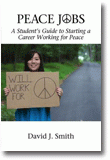Peace Jobs – A Student’s Guide to Starting a Career Working for Peace
REVIEWS, 6 Jun 2016
David J. Smith | George Mason University – TRANSCEND Media Service
 This book is a guide for college students exploring career options who are interested in working to promote peacebuilding and the resolution of conflict. High school students, particularly those starting to consider college and careers, can also benefited from this book.
This book is a guide for college students exploring career options who are interested in working to promote peacebuilding and the resolution of conflict. High school students, particularly those starting to consider college and careers, can also benefited from this book.
A major feature of the book is 30 stories from young professionals, most recently graduated from college, who are working in the field. These profiles provide readers with insight as to strategies they might use to advance their peacebuilding careers.
The book speaks directly to the Millennial generation, recognizing that launching a career is a major focus, and that careers in the peace field have not always been easy to identify. As such, the book takes the approach that most any career can be a peacebuilding career provided one is willing to apply creativity and passion to their work.
A volume in the series: Peace Education. Editor(s): Laura Finley, Barry University. Robin Cooper, Nova Southeastern University. Published 2016
Endorsements:
“The 30 profiles and other examples of career options across disciplines in Peace Jobs should be a required resource for all high school and college career offices. Packed with valuable realistic examples of how students, from a wide array of backgrounds, connected their passion with a paid career, it answers the ever present question ‘but what job can I get in peacebuilding’”?
— Jennifer Batton, Co-Chair, Peace Education Working Group and Chair, North America, Global Partnership for the Prevention of Armed Conflict. Coordinator, International Conference on Conflict Resolution Education.
“If changing the world is your calling, David Smith offers the guiding framework to channel passions and talents into meaningful employment. In Peace Jobs, millennials and others can discover ways to apply their social conscience to traditional and transformative career opportunities.”
— Tony Jenkins, PhD, Director, Peace Education Initiative, The University of Toledo. Managing Director, International Institute on Peace Education. Coordinator, Global Campaign for Peace Education.
Contents:
Peace Education Series Introduction, Laura Finley and Robin Cooper Preface. Acknowledgments. CHAPTER 1. What is a Peace Job? CHAPTER 2. Preparing for and Finding a Peace Job. CHAPTER 3. Peacebuilding Careers in Diplomacy. CHAPTER 4. Enforcing Peace and Justice Through Human Rights and Law. CHAPTER 5. Working in Conflict: NGO, IGO, Humanitarian, and Military Careers. CHAPTER 6. Teaching About Peace and Conflict. CHAPTER 7. Activism: Social Justice and Environmental Action. CHAPTER 8. A Healing Approach: Health, Community, and Faith-Based Strategies. CHAPTER 9. Creating Peace: The Arts, Science, Technology, and Media. CHAPTER 10. Pursuing Peacebuilding Education. APPENDIX A: 86 Peace Jobs for College Grads. APPENDIX B: Peace Jobs Glossary. APPENDIX C: Peace Jobs Career Resources. APPENDIX D: Additional Readings. About the Author.
Author David Smith writes about Nurturing the Peacebuilders and Conflict Resolvers of Tomorrow on Mediate.com
Go to Original – infoagepub.com
DISCLAIMER: The statements, views and opinions expressed in pieces republished here are solely those of the authors and do not necessarily represent those of TMS. In accordance with title 17 U.S.C. section 107, this material is distributed without profit to those who have expressed a prior interest in receiving the included information for research and educational purposes. TMS has no affiliation whatsoever with the originator of this article nor is TMS endorsed or sponsored by the originator. “GO TO ORIGINAL” links are provided as a convenience to our readers and allow for verification of authenticity. However, as originating pages are often updated by their originating host sites, the versions posted may not match the versions our readers view when clicking the “GO TO ORIGINAL” links. This site contains copyrighted material the use of which has not always been specifically authorized by the copyright owner. We are making such material available in our efforts to advance understanding of environmental, political, human rights, economic, democracy, scientific, and social justice issues, etc. We believe this constitutes a ‘fair use’ of any such copyrighted material as provided for in section 107 of the US Copyright Law. In accordance with Title 17 U.S.C. Section 107, the material on this site is distributed without profit to those who have expressed a prior interest in receiving the included information for research and educational purposes. For more information go to: http://www.law.cornell.edu/uscode/17/107.shtml. If you wish to use copyrighted material from this site for purposes of your own that go beyond ‘fair use’, you must obtain permission from the copyright owner.